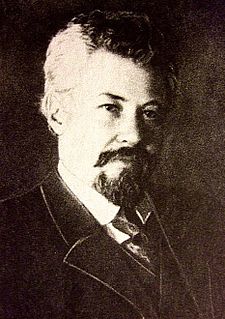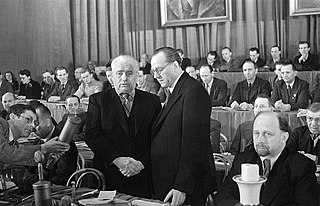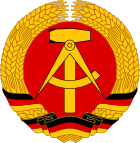
The Peace and Freedom Party (PFP) is a left-wing political party with affiliates and former members in more than a dozen American states, including California, Colorado, Florida, Hawaii, Indiana and Utah, but none now have ballot status besides California. Peace and Freedom's first candidates appeared on the ballot in 1966 in New York. The Peace and Freedom Party of California was organized in early 1967, gathering over 103,000 registrants which qualified its ballot status in January 1968 under the California Secretary of State Report of Registration.
A write-in candidate is a candidate in an election whose name does not appear on the ballot, but for whom voters may vote nonetheless by writing in the person's name. The system is almost totally confined to elections in the United States. Some U.S. states and local jurisdictions allow a voter to affix a sticker, with the write-in candidate's name, to the ballot in lieu of actually writing in the candidate's name. Write-in candidacies are sometimes a result of a candidate being legally or procedurally ineligible to run under his or her own name or party; write-in candidacies may be permitted where term limits bar an incumbent candidate from being officially nominated for, or being listed on the ballot for, re-election. In some cases, write-in campaigns have been organized to support a candidate who is not personally involved in running; this may be a form of draft campaign.

Elections to the All-Russian Constituent Assembly were held on 25 November 1917, around 2 months after they were originally meant to occur, having been organized as a result of events in the Russian Revolution of 1917. They are generally recognised to be the first free elections in Russian history.
Elections in Germany include elections to the Bundestag, the Landtags of the various states, and local elections.

Elections in North Korea are held every four-to-five years for the Supreme People's Assembly (SPA), the country's national legislature, and every four years for Local People's Assemblies.

Parliamentary elections were held for the first Supreme People's Assembly in the Soviet-occupied North Korea on 25 August 1948. A total of 572 deputies were elected, of which 360 were reserved for representatives of South Korea. The North Korean government claimed that 77.8% of South Korean voters had taken part in underground elections to elect 1,000 delegates who would elect the 360 South Korean members of the SPA. Voters were presented with a single list from the Democratic Front for the Reunification of the Fatherland, which was dominated by the Workers' Party of Korea.

Presidential elections were held in the Democratic Republic of the Congo on 1 November 1970. The only candidate was Joseph Mobutu, who had taken power in a military coup five years earlier. The elections took the format of a "yes" or "no" vote for Mobutu's candidacy, with the results showing he won more "yes" votes than the number of registered voters, even though voting was not compulsory.

Constitutional Convention elections were held in Iran on 3 and 4 August 1979. The result was a victory for the Islamic Republican Party. 10,784,932 voted in the elections, marking 51.71% turnout. Of all members elected, 68% were clerics.

Legislative elections were held in the German Democratic Republic on 8 June 1986. 500 deputies to the Volkskammer were elected, with all of them being candidates of the single-list National Front. 703 Front candidates were put forward, with 500 being elected and 203 becoming substitute deputies. At its first session on 16 June, the Volkskammer re-elected Willi Stoph as Chairman of the Council of Ministers, while Erich Honecker, General Secretary of the ruling Socialist Unity Party, was also re-elected Chairman of the Council of State.

Legislative elections were held in the German Democratic Republic on 14 June 1981. 500 deputies to the Volkskammer were elected, with all of them being candidates of the single-list National Front. 679 Front candidates were put forward, with 500 being elected and 179 becoming substitute deputies. At its first session on 25 June, the Volkskammer re-elected Willi Stoph as Chairman of the Council of Ministers, while Erich Honecker, General Secretary of the ruling Socialist Unity Party, was also re-elected Chairman of the Council of State.

Legislative elections were held in the German Democratic Republic on 17 October 1976. 434 deputies to the Volkskammer were elected, with all of them being candidates of the single-list National Front. 591 Front candidates were put forward, with 434 being elected and 157 becoming substitute deputies. At its first session on 29 October, the Volkskammer elected Willi Stoph as Chairman of the Council of Ministers, while Erich Honecker, General Secretary of the ruling Socialist Unity Party, was elected Chairman of the Council of State. The allocation of seats remained unchanged from previous elections.

Legislative elections were held in the German Democratic Republic on 14 November 1971. 434 deputies to the Volkskammer were elected, with all of them being candidates of the single-list National Front. 584 Front candidates were put forward, with 434 being elected. The allocation of seats remained unchanged from previous elections.

Legislative elections were held in the German Democratic Republic on 16 November 1958. There were 466 deputies to the Volkskammer in total. All were candidates of the single-list National Front, dominated by the Socialist Unity Party of Germany. The list received the approval of 99.9% of voters, with turnout reported to be 99.2%.

Legislative elections were held in the German Democratic Republic on 17 October 1954. There were 466 deputies to the Volkskammer in total. All were candidates of the single-list National Front, dominated by the Communist Socialist Unity Party of Germany. The list received the approval of 99.46% of voters, with turnout reported to be 98.5%.

Elections for the Third German People's Congress were held in East Germany on 15 and 16 May 1949. Voters were presented with a "Unity List" from the "Bloc of the Anti-Fascist Democratic Parties," which in turn was dominated by the Communist Socialist Unity Party. They only had the option of approving or rejecting the list. In much of the country, the vote was not secret.

The merger of the Communist Party of Germanyand the Social Democratic Party of Germanyinto the Socialist Unity Party of Germany occurred on 21 April 1946 in the territory of the Soviet occupation zone: it is also called the forced merger of the KPD and SPD. In the course of the merger, about 5,000 Social Democrats who opposed it were detained and sent to camps and jails.
Evelyn Zupke is a specialist care and social worker who came to prominence in the German Democratic Republic during the 1980s as a democracy activist.
Bertram Wieczorek is a German physician and former politician (CDU).













